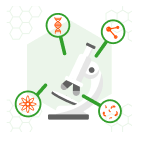Genetic Testing and Kids – Let’s Not Overlook Their Dreams!!!

Anticipated benefits of existing and emerging genome diagnostics include definitive diagnosis and risk identification, enabling early intervention and a precision medicine approach to management that can potentially decrease morbidity and improve quality of life. As such, applications of genome-wide technologies may be particularly beneficial in children since early diagnosis, risk identification and tailored intervention can result in lifelong benefit. Also, diagnosis and risk information generated for an index child may have significant health and non-health related implications for family members. 1
While a wide range of patient-reported outcome measures have been applied in the genomics literature to reflect on patients’ preferences, experiences, and psychosocial responses to genetic testing, patient-oriented utility (i.e., personal, or perceived utility) has emerged as a core construct that unifies many of these elements and reflects on the subjective informational value of genetic testing. Personal and perceived utility have been described as constructs of value that include the subjective health and non-health-related meanings and uses of genetic testing and/or a genetic diagnosis, such as increasing knowledge and feelings of control, and optimizing care for individuals and family members in the present and for the future. 1
Application of Genetic Testing for Kids
One of the studies reviewed the usefulness of genetic testing children, reported that parents characterized the value of genetic testing as intrinsic in terms of the test’s ability to provide a much sought-after answer in terms of its ability to guide care, access health and social services, reduce stigma, make family planning decisions, and engage in proactive prevention strategies.
Specifically, the studies revealed that a parent can come know regarding following domains 1:
- Cognitive
- Behavioral
- Social
Other aspects can also analyzed and can be reported to parents such as 1:
- Feeling of responsibility
- Mental preparation
- Enhanced coping
- Spirituality
- Communication, etc.
Let them fly high!!!
MyDNA Gene Proactive-Kids is a genetic test that is meticulously designed to assess 40+ conditions that can assess child’s health and well-being. This test can give you the information regarding your child’s overall health and development. The information can be helpful to pen down your child’s strengths that can be helpful in planning his future. It can assess the following :
- Skin and Hair: Gain insights into unique genetic markers influencing skin colour, eye colour, teenage acne, sunburn susceptibility, and various hair conditions.
- Fitness: Assess muscle performance, adaptation capabilities, motivation levels, and sleep cycles for a holistic understanding of your child's physical well-being.
- Behavioural: Illuminate the mental well-being of your child through insights into behavioral traits, social skills, planning abilities, emotional awareness, stress management, empathy, memory, and dietary factors.
- Intolerances: Proactively identify genetic predispositions to allergies, enabling parents to take preventive measures and provide optimal care.
- Inflammatory Condition: Understand the genetic risks associated with inflammatory conditions such as asthma, paving the way for informed health management.
Why Choose MyDNA Gene Proactive-Kids?
- Holistic Understanding: Unlock a comprehensive analysis of over 40 conditions, gaining insights into your child's health, cognitive abilities, behavioural tendencies, sports traits, etc.
- Tailored Insights: Gain a profound understanding of your child's health and capabilities, including risks associated with diet, allergies, nutrition, and lifestyle.
- Proactive Healthcare: Embrace preventive measures with personalised recommendations to proactively manage your child's well-being.
- Holistic Support: Benefit from free genetic counselling and expert guidance, ensuring a holistic approach to your child's health journey.
Who Should Take MyDNA Gene Proactive -Kids ?
- Forward-Thinking Parents: Parents keen on planning and safeguarding their child's future, with a focus on preventive healthcare.
- Strength-Seeking Parents: Those desiring insights into their child's unique strengths, enabling strategic planning for their development.
- Families with Genetic History: Individuals with a family history of genetic disorders or diseases can proactively assess and manage risks.
How Do We Analyse?
Polygenic Risk Score
Based on Polygenic Risk Score (PRS), this report is generated. A polygenic risk score (PRS) estimates an individual’s genetic risk (predisposition) for a trait or condition. PRS takes the sum (aggregate) of SNPs to calculate an overall genetic risk for a particular condition.
How it works?

Order a Kit
.png)
Sample Collection: A technician will visit you to perform the test & collect the saliva sample, ensuring the process is quick, accurate and convenient.

Lab Processing & Data Analysis

Report Generation

Access Your Results: Log into your account or check your email.

Schedule your Genetic Counselling
References :
- Anjana RM, Unnikrishnan R, Deepa M, Pradeepa R, Tandon N, Das AK, Joshi S, Bajaj S, Jabbar PK, Das HK, Kumar A, Dhandhania VK, Bhansali A, Rao PV, Desai A, Kalra S, Gupta A, Lakshmy R, Madhu SV, Elangovan N, Chowdhury S, Venkatesan U, Subashini R, Kaur T, Dhaliwal RS, Mohan V; ICMR-INDIAB Collaborative Study Group. Metabolic non-communicable disease health report of India: the ICMR-INDIAB national cross-sectional study (ICMR-INDIAB-17). Lancet Diabetes Endocrinol. 2023 Jun 7:S2213-8587(23)00119-5. doi: 10.1016/S2213-8587(23)00119-5.
- Prabhakaran D, Jeemon P, Roy A. Cardiovascular Diseases in India: Current Epidemiology and Future Directions. Circulation. 2016 Apr 19;133(16):1605-20. doi: 10.1161/CIRCULATIONAHA.114.008729.
- Chaturvedi V, Parakh N, Seth S, Bhargava B, Ramakrishnan S, Roy A, et al. Heart failure in India: The INDUS (INDia Ukieri Study) study. J Pract Cardiovasc Sci 2016;2:28-35.